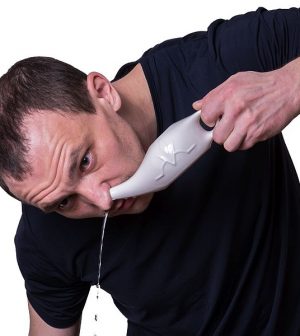- Could Your Grocery Store Meat Be Causing Recurring UTIs?
- Are You Making This Expensive Thermostat Error This Winter?
- Recognizing the Signs of Hypothyroidism
- 10 Strategies to Overcome Insomnia
- Could Artificial Sweeteners Be Aging the Brain Faster?
- Techniques for Soothing Your Nervous System
- Does the Water in Your House Smell Funny? Here’s Why
- Can a Daily Dose of Apple Cider Vinegar Actually Aid Weight Loss?
- 6 Health Beverages That Can Actually Spike Your Blood Sugar
- Treatment Options for Social Anxiety Disorder
Sinus Infections: What You Need to Know

Along with the flu, this is the time of year for sinus infections with their make-you-miserable stuffy, runny noses and blocked ears.
Most sinus infections are caused by viruses, but bacteria can also be to blame, according to Dr. Jessica Grayson, an assistant professor of otolaryngology at the University of Alabama at Birmingham.
“When people say they have sinus pressure, they may mean nasal congestion,” Grayson said in a university news release. “Bilateral congestion could mean a person has a viral infection or an allergic reaction. Viral infections don’t pick and choose a side.”
If your sinus pressure is isolated, you might have a bacterial infection, and that means you need to see a doctor and probably need an antibiotic, she said. Taking too many, though, can have negative effects on the immune system.
“With a virus,” Grayson added, “you just have to let it run its course.”
But a nasal decongestant like Afrin can help, she said. Grayson recommends using it at night and for no more than three or four days in a row. Use it longer and you run the risk of getting rebound congestion. “This starts a vicious cycle of becoming addicted to using the product,” she said.
Using saline irrigation or a neti pot can also help by washing out the nasal passages, Grayson said. For the first few days of infection, though, it’s ineffective because the nose is too swollen. Nasal steroids such as Flonase can help reduce inflammation, she said.
It’s also flu season. “Get vaccinated,” Grayson recommended. “Even if you do get the flu, it can still help with the severity of the symptoms.”
And, she pointed out, there is some evidence that eating cruciferous vegetables like broccoli, Brussels sprouts, collards, kale and cauliflower may help prevent viral infections. “Having a smoothie with kale or a side of broccoli can go a long way,” Grayson said.
If you lose your sense of smell after a cold or bacterial infection, see your doctor, she advised. Treatment can include zinc and lipoic acid supplements, and possibly smell retraining.
More information
For more on sinus infections, head to the American College of Allergies, Asthma and Immunology.
Source: HealthDay
Copyright © 2026 HealthDay. All rights reserved.










